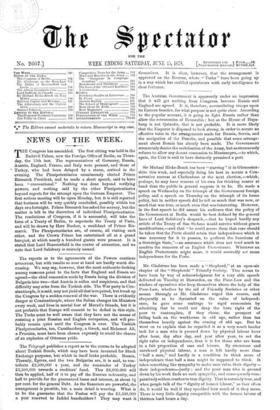Mr. Gladstone has been made a " Shepherd," at an
open-air chapter of the " Shepherds' " Friendly Society. This seems to have been by way of acknowledgment for a very able speech delivered on Tuesday at Hawarden, on the Poor-Law and the wisdom of operatives who keep themselves above the help of the Poor-Law, whether by the aid of Friendly Societies or other means. Strongly as Mr. Gladstone urged this course, and eloquently as he descanted on the value of independ- ence, he gave some umbrage to rigid economists by admitting that he could not deny the bare right of the poor to contemplate, if they chose, the prospect of falling back on the workhouse in old age, rather than tax themselves heavily against the coming of old age. But he went on to explain that he regarded it as a very much harder task for a man who is pressed down by physical labour hour after hour, day after day, and year after year, to set the right value on independence, than it is for those who are born to a fair. proportion of ease and leisure. By strenuous and unrelaxed physical labour, a man is left hardly more than "half a man," and hardly in a condition to think more of independence than half a man might be supposed to think. It takes something like sympathy to make men value their dignity— their independence—justly ; and the poor man who is ground down by his work finds no such sympathy, and consequently com- paratively seldom reaches to true dignity. That is certainly true, and when people talk of the "dignity of honest labour," as they often do, it would be well if they specified how much of it they mean. There is very little dignity compatible with the honest labour of thirteen hard hours a day.


































